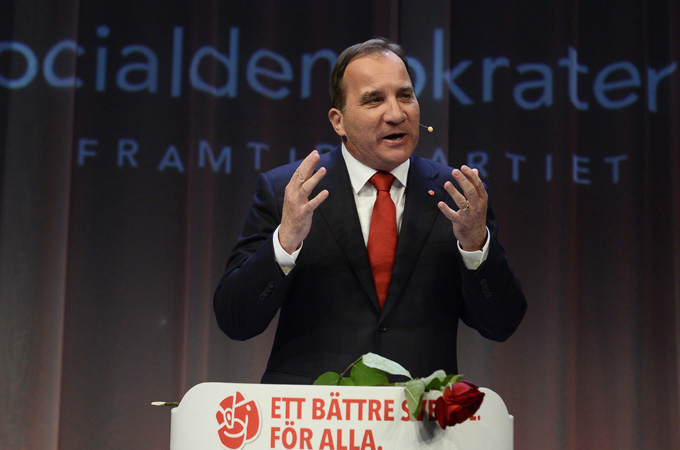Swedish left-wing bloc wins election
Social Democrats to lead new government – but far-right party scores large gains to become third-largest in country.

Sweden’s centre-left Social Democrats and allies are poised to return to power after defeating the centre-right government, in a general election that also resulted in strong gains for an anti-immigration party.
With all voting districts tallied by Monday morning, the Social Democrat-led bloc won 43.7 percent of the vote while the ruling centre-right coalition, led by the Moderate Party, gained 39.3 percent.
But the anti-immigration far-right Sweden Democrats were celebrating large gains as the party won 12.9 percent of votes cast – more than doubling the 5.7 percent of votes won in the 2010 election.
“Sweden friends, party friends, now we’re Sweden’s third-largest party,” party leader Jimmie Akesson told cheering supporters late on Sunday.
| PARTIAL RESULTS |
|
Social Democrats 31.2%
Moderate Party 23.2%
Sweden Democrats 12.9%
Green Party 6.8%
Centre Party 6.1%
Left Party 5.7%
Liberal Party 5.4%
Christian Democrats 4.6%
Voter turnout: 83.4%
|
With no majority reached, a complicated process of forming a government is expected as the centre-left pledged not to cooperate with the Sweden Democrats. The outgoing coalition has made the same promise.
The Social Democrats’ leader and prime minister-designate, Stefan Lofven, a former union leader, reiterated this pledge in his midnight victory speech.
BACKGROUND: Parties and issues in Sweden’s elections
His party has said it will team up with the Greens, and in his speech, Lofven said he was “extending a hand” to “democratic parties”, stressing that Sweden was facing a new parliamentary situation.
“It’s time to put party interests aside,” he said. “Our country is too small for conflicts.”
The Social Democrats dominated Swedish politics during most of the 20th century and its single-party government ruled the country from 1994 to 2006 with support from allies.
The current prime minister, Fredrik Reinfeldt, who led the country during eight years of tax reductions and pro-market reforms, said he would hand in his resignation on Monday and also leave the leadership of the Moderates in spring.
Rising refugee numbers
Xenophobia and racism have been high on the election agenda, and polls predicted a rise by the far-right. Sweden has some of the most generous asylum policies in the world, and 80,000 refugees from Syria, Eritrea, Somalia, Afghanistan, Iraq, and other countries are expected to arrive this year – the highest number since 1992.
The Sweden Democrats want to cut immigration by 90 percent and have campaigned against the “mixing of cultures” – especially lashing out at Muslim immigration.
Najat Mahamed, who moved to Sweden from Eritrea about 25 years ago, told Al Jazeera: “It’s sad that so many people share their opinions, but we live in a democracy, so people need to be allowed to vote how they want.”
 |
| Prime Minister-designate Lofven said Swedes ‘asked for change and they got change’ [Reuters] |
Mahamed voted for the Greens, a party she normally does not support, hoping that it would become the third biggest party in parliament rather than the Sweden Democrats.
However, the Green Party won only 6.8 percent of votes.
While the Sweden Democrats celebrated their success, a call circulated on social media for its opponents to observe a “day of mourning” on Monday and dress totally in black.
In Sweden’s third city, Malmo, another kind of blackout hit the party as a dispute erupted over the YMCA-owned premises where members had gathered to watch the results.
The chairman of the YMCA branch said political gatherings were not allowed, cut the electricity and left party members following the broadcast on mobile devices by candle light.
Besides immigration, education, and unemployment, gender equality had been prominent issues in the campaign.
Early exit polls suggested that the leftist Feminist Initiative had reached the four-percent threshold needed to enter the Riksdag, but the partial results gave the party only 3.1 percent.
An intense campaign by the Feminist Initiative, emboldened after winning a seat in the European parliament, has forced other parties to offer programmes to improve the country’s gender equality, which is already praised internationally.
About 200,000 votes, or three percent of the electorate, remain uncounted. Most of the ballots are from expatriates.